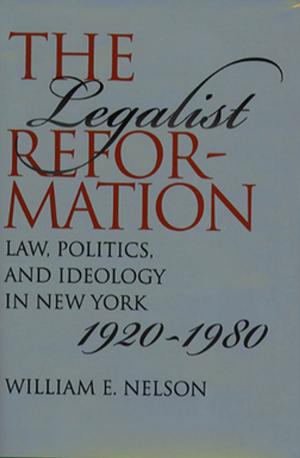Sociology and Scientism
The American Quest for Objectivity, 1880-1940
Nonfiction, Social & Cultural Studies, Social Science, Sociology| Author: | Robert C. Bannister | ISBN: | 9781469616230 |
| Publisher: | The University of North Carolina Press | Publication: | February 1, 2014 |
| Imprint: | The University of North Carolina Press | Language: | English |
| Author: | Robert C. Bannister |
| ISBN: | 9781469616230 |
| Publisher: | The University of North Carolina Press |
| Publication: | February 1, 2014 |
| Imprint: | The University of North Carolina Press |
| Language: | English |
During the 1920s a new generation of American sociologists tried to make their discipline more objective by adopting the methodology of the natural sciences. Robert Bannister provides the first comprehensive account of the emergence of this "objectivism" within the matrix of the evolutionism of Lester Ward and other founders of American sociology.
Objectivism meant confining inquiry to the observable externals of social behavior and quantifying the results. Although objectivism was a marked departure from the theoretical and reformist sociology of the prewar years, and caused often-fierce intergenerational struggle, sociological objectivism had roots deep in prewar sociology.
Objectivism first surfaced in the work of sociology's "second generation," the most prominent members of which completed their graduate work prior to World War I. It gradually took shape in what may be termed "realist" and "nominalist" variants, the first represented by Luther Lee Bernard and the second by William F. Ogburn and F. Stuart Chapin. For Bernard, a scientific sociology was radical, prescribing absolute standards for social policy. For Ogburn and Chapin, it was essentially statistical and advisory in the sense that experts would concern themselves exclusively with means rather than ends.
Although the objectivists differed among themselves, they together precipitated battles within the American Sociological Society during the 1930s that challenged the monopoly of the Chicago School, paving the way for the informal alliance of Parsonian theorists and a new generation of quantifiers that dominated the profession throughout the 1950s. By shedding new light on the careers of Ward and the other founders and by providing original accounts of the careers of the leading objectivists, Bannister presents a unique look at the course of sociology before and after World War I. He puts theory formation in an institutional, ideological, and biographical setting, and thus offers an unparalleled look at the formation of a modern academic profession.
During the 1920s a new generation of American sociologists tried to make their discipline more objective by adopting the methodology of the natural sciences. Robert Bannister provides the first comprehensive account of the emergence of this "objectivism" within the matrix of the evolutionism of Lester Ward and other founders of American sociology.
Objectivism meant confining inquiry to the observable externals of social behavior and quantifying the results. Although objectivism was a marked departure from the theoretical and reformist sociology of the prewar years, and caused often-fierce intergenerational struggle, sociological objectivism had roots deep in prewar sociology.
Objectivism first surfaced in the work of sociology's "second generation," the most prominent members of which completed their graduate work prior to World War I. It gradually took shape in what may be termed "realist" and "nominalist" variants, the first represented by Luther Lee Bernard and the second by William F. Ogburn and F. Stuart Chapin. For Bernard, a scientific sociology was radical, prescribing absolute standards for social policy. For Ogburn and Chapin, it was essentially statistical and advisory in the sense that experts would concern themselves exclusively with means rather than ends.
Although the objectivists differed among themselves, they together precipitated battles within the American Sociological Society during the 1930s that challenged the monopoly of the Chicago School, paving the way for the informal alliance of Parsonian theorists and a new generation of quantifiers that dominated the profession throughout the 1950s. By shedding new light on the careers of Ward and the other founders and by providing original accounts of the careers of the leading objectivists, Bannister presents a unique look at the course of sociology before and after World War I. He puts theory formation in an institutional, ideological, and biographical setting, and thus offers an unparalleled look at the formation of a modern academic profession.















